In the first Masterclass of our UN Sustainable Development Goal series, we address Goal One: "No Poverty" and unpack the role the textile and fashion industry plays in contributing to poverty across the globe, as well as how ethical fashion production and conscious consumerism can alleviate its devastating impact.
To meet this SDG and "end poverty in all its forms everywhere", our industry must take action in improving wages, well-being, and opportunities for workers, building resilience into the regions that have such an integral role in the global fashion economy. Hear from experts working across a range of charities, business communities, and social enterprises, sharing their first-hand accounts of the positive impact of fair trade partnerships, organic farming methods, and educational programmes, in countries including India, Bangladesh, and Malawi. Learn how to use your business to empower workers and to stamp out poverty through long-term, sustainable practices in fashion production and trade.
In this Masterclass you will learn:
- About Goal One of the UN's Sustainable Development Goals (SDGs): 'No Poverty' and how it relates to fashion and textile businesses
- How to approach the 17 UN Sustainable Development Goals as a creative entrepreneur and embed the goals into all that your business does
- How the fashion and textile industry impacts regional economies, people's livelihoods, and levels of prosperity and poverty around the world
- How to use your fashion business to improve access to sustainable livelihoods, entrepreneurial opportunities, and productive resources
- About Fair Trade, its benefits in local communities and enterprise, and how to work with Fair Trade organisations as a fashion business and brand
- How the COVID-19 pandemic has impacted global poverty
-
The Second-Hand Clothing Market and How to Incorporate Upcycled Textiles Into Your Business, with Oxfam
with Elen Newcombe-LingRead More...Summary
Have you ever wondered how you can begin to incorporate second-hand textiles into your business? Or wondered where all the clothes that get donated to charity shops actually go?
In this video, we chat to Elen Newcombe-Ling, Private Sector Partnerships Manager at Oxfam GB, about the second-hand clothing industry. We discover how Oxfam processes all their textile donations, the positive social and environmental impacts of the second-hand market, and how to start to incorporate second-hand textiles into your design business.
-
The Impact Of Fair Trade On Reducing Poverty And Increasing Empowerment
with Jette LadigesRead More...Summary
The World Fair Trade Organisation (WFTO) is a global organisation comprising 401 member organisations, all committed to improving the livelihoods of economically marginalised groups.
In this Lesson, with Jette Ladiges, Partnerships Manager of the WFTO, we learn what role the organisation plays in reducing poverty, in campaigning for the rights of farmers, workers and SMEs, and in addressing gender equality via their democratic community of member organisations working across the world.
-
How Cotton Farming Creates, Affects and Could Alleviate Poverty
with Aneel Kumar AmbavaramRead More...Summary
In an eye-opening discussion about the current situation of cotton farming and its contribution to poverty cycles among rural communities in India today, Aneel Kumar Ambavaram and Sanne van den Dungen from Grameena Vikas Kendram (GVK Society), share information about the organisation's RESET programme that aims to regenerate the environment, society and economy through textiles. This makes an unmissable lesson for anyone who wants to know how cotton truly figures into the everyday lives of farmers and villages where the fibre originates.
-
Innovative Business Through Textile Re-Use In The Backyard Garment Sector
with Maveen PereiraRead More...Summary
Traidcraft Exchange's research, funded with the help of TRAID, into the informal garment industry in Bangladesh offers an insightful vision of the potential to reduce textile waste and increase creative income for local entrepreneurs in a country where the global ready-made garment sector dominates the economy. In this Lesson, you'll learn more about the backyard garment industry in Bangladesh.
This is a segment cut from a full interview with Maveen Pereira, Director of Programmes at Traidcraft Exchange.
-
Advocating For Women's Rights In Cotton Farming
with Maveen PereiraRead More...Summary
Traidcraft Exchange's strategy for women's empowerment addresses the fact that women make up a significant part of our global workforce head-on. Here we learn about why women's rights should be advocated for, and why in particular, within the cotton agriculture sector.
This is a segment cut from the full interview with Maveen Pereira, Director of Programmes at Traidcraft Exchange.
-
Transforming Conditions And Rights For Marginalised Jute Producers
with Maveen PereiraRead More...Summary
As one of the world's longest natural fibres, jute has important applications in manufacturing, from luxury fashion products to road construction, and India's jute industry is one of the largest in the world. Here we learn about the background to the industry, including the labour-intensive process jute workers must carry out to provide the 'golden fibre', with little pay, limited rights and unimaginable conditions.
This is a segment cut from a full interview with Maveen Pereira, Director of Programmes at Traidcraft Exchange.
-
Improving Traceability And Transparency For Homeworkers
with Maveen PereiraRead More...Summary
Homeworkers are the backbone of the Indian textile export industry; there are millions who carry out "piecework" from home, contributing to the global textile market from the bottom of complex supply chains. In this Lesson, learn about the hidden workers of fashion: the homeworkers working with zero contracts, no union support or employee benefits, and no regular salary, yet who provide intricate embellishment to our clothing.
This is a segment from a full interview with Maveen Pereira, Director of Programmes at Traidcraft Exchange.
-
Market Pricing, Demand and Opportunities For Regenerative Cotton
with Aneel Kumar AmbavaramRead More...Summary
While it is easy to perceive the benefits of regenerative cotton farming for the environment and people, there are still key, practical barriers to overcome to see a wider uptake within the fashion and textiles industry.
In this Lesson, we speak to Aneel Kumar Ambavaran and Sanne van den Dungen at Grameena Vikas Kendram (GVK Society), to learn what the challenges and opportunities are for regenerative cotton vs. conventional farming models and why increased transparency is crucial to demonstrate market value for the future of these beautiful crops.
Thumbnail image from Money Control.
-
How Handweaving Clusters Support Livelihoods And Wellbeing
with Amit SinghaRead More...Summary
Handwoven fabrics form an integral part of Indian's rich textile culture and, in Bengal, the tradition is particularly strong with a significant cluster of handloom workers operating to produce everything from fine jacquard saris to khadi fabrics.
This interview with an expert in the field explains how handweaving clusters in East India operate, how they support family life and wellbeing, and why they are a stable form of livelihood for this area of the world.
-
Supportive Solutions To Restore Regional Weaving Practices
with Dianoshiya Dorothy ClementRead More...Summary
Weaver and designer Dianoshiya Dorothy Clement joins us to introduce her work with artisans in the Chennimalai province of the Tamil Nadu region of India. With the population of weavers decreasing due to lack of demand and increase in faster textile production elsewhere, there needs to be sympathetic solutions that will provide the craftspeople with both income and creativity to restore the pride in this profession.
This is a beautiful explanation of how to work supportively with an artisan community, along with insight into the affects of declining production on poverty levels. The lesson also includes a film from Dianoshiya that gives you a real look at what handloom weavers do.
Interviews
Powerful Techniques to Incite Change
Wednesday May 1st, 2019
Mayamiko: Using Fashion To Increase Awareness of Sustainable Fibres and Empower Local Communities
Friday May 1st, 2020
People Tree: Working with Fair Trade Producers and Sustainable Fibres
Friday May 1st, 2020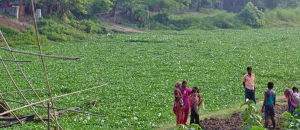
Traidcraft Exchange: Fighting Injustices In Trade To Eliminate Poverty
Saturday Jan 2nd, 2021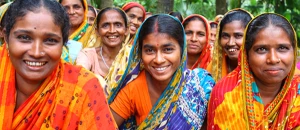
Technical Tutorials
Sustainable Development Goal #1: No Poverty
Friday Jan 1st, 2021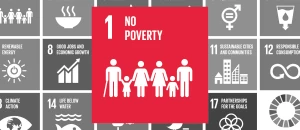
How Fashion Businesses Can Prevent Modern Slavery
Friday Jan 1st, 2021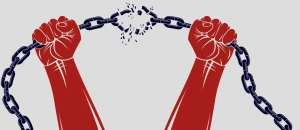
Demystifying Conventional and Sustainable Cotton Farming
Friday Jan 1st, 2021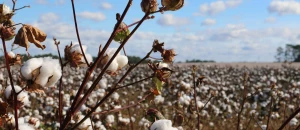
Past Events
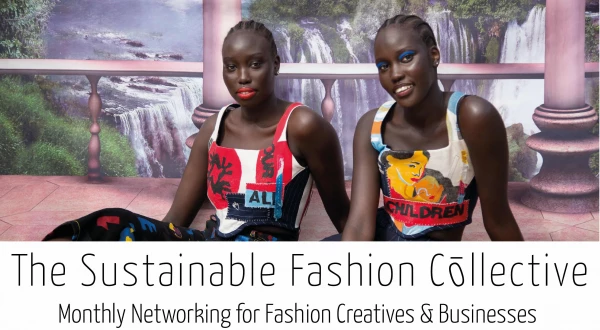
In Conversation With: Bethany Williams and The Magpie Project
Wednesday Feb 24th, 2021 - 19:00pmOnline only
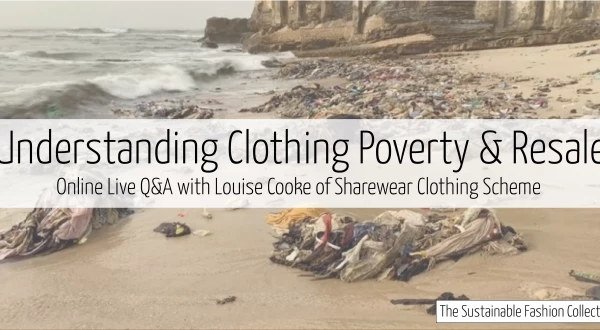
Understanding Clothing Poverty & The Donation Economy with Sharewear Clothing Scheme
Friday Mar 20th, 2020 - 00:00amAdditional links:
Human Development Report 2020 [UNDP]
Follow on Masterclasses:
Ethical Fabrics And Why We Need To Use Them
Additional Reading
How To Fight Injustice With Fair Trade Fabrics
Monday Feb 8th, 2021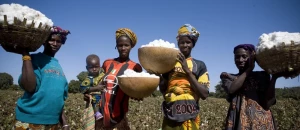
What Are The Sustainable Development Goals And Why Should Your Brand Support Them
Monday Jan 11th, 2021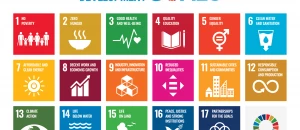
Building A British Fibreshed And Its Benefit For Fashion
Friday Jul 3rd, 2020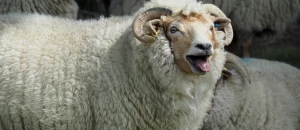
What is Fast Fashion doing to the planet, its people, and our state of mind?
Sunday Feb 9th, 2020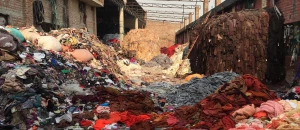
What is Fast Fashion and Why Is It Still So Popular?
Monday Jan 20th, 2020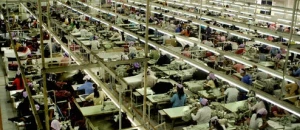
Sustainable Fashion Milestones from the 2010s
Monday Jan 13th, 2020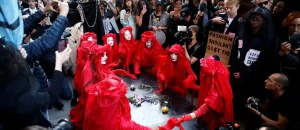
Eco producers, manufacturers and innovators at Première Vision September 2019
Monday Sep 30th, 2019
Tips for attending fabric trade shows like Première Vision
Monday Sep 30th, 2019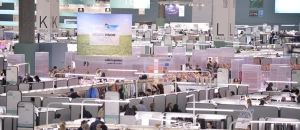
The sustainable brands redefining luxury with made-to-order business models
Monday Sep 16th, 2019
Recycling for Fashion: Should We Give Plastics a Second Chance?
Monday Jul 22nd, 2019
